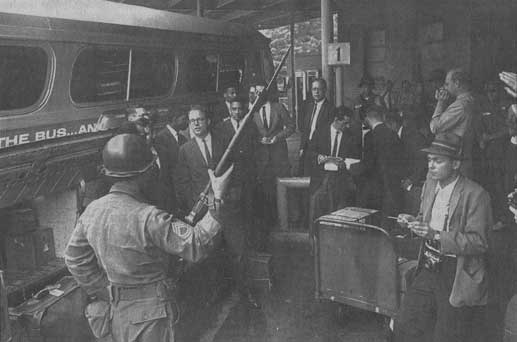
ATLANTA - About 500 schoolchildren got a history lesson Friday about the civil rights-era Freedom Rides from those who risked their lives to end segregation.
Rep. John Lewis, D-Ga., and other veterans of the nonviolent movement to integrate interstate buses and trains talked to the children during a stop on a three-day re-enactment tour to celebrate the 40th anniversary of the Freedom Rides.
"People say nothing has changed, said Lewis, one of the 13 original Freedom Riders - black and white - who traveled through the South on public buses in 1961 to test a Supreme Court ruling banning racial segregation on interstate buses and trains.
"Come walk in our shoes. Come ride the bus with us. We will show you that things have changed." The rides retracing part of the route they traveled left Washington on Thursday and will finish the tour today in Alabama.
The Freedom Riders, mostly college students, set out in May 1961 to ride buses from Washington to New Orleans. At segregated bus stations, black riders tried to use white waiting rooms and bathrooms, while whites tried to use facilities set aside for blacks.
When the riders were beaten and arrested along the way hundreds more joined the campaign. Eventually more than 1,000 people took part.
"When we look at what has happened in this country, we are proud to have played a small part, said Hank Thomas, who was a 19-year-old Howard University student in 1961. Thomas 4 aboard a Greyhound bus outside Anniston, Ala., when it was attacked and fire-bombed by a mob of segregationists. Smoke filled the bus, he said, and some members of the mob outside held the doors closed until the exploding gas tank scared them away.

A bus load of Freedom Riders, including four white college professors and three black students, arrives in Montgomery, Ala., in May 1961, guarded by police ~nd members of the National Guard.
"I had a decision to make and that was How am I going to die? Am I going to stay in here and burn to death or go out and get beat to death?" Thomas said.
Thomas escaped from the bus and survived, as did the others. But about 350 people, including Lewis, were arrested for violating state segregation laws. They never made it to New Orleans.
Although she had heard about the horrors of segregation, high school senior Aissa Ware knew nothing about the Freedom Riders before Friday's event at Clark Atlanta University. "I learned a lot," she said. "I've always had respect for people who helped the cause.
Lewis said there is one thing no one can explain, even now. "I still don't understand 40 years later: What anger did those people feel? Why did they have to beat us so? asked Lewis, who was attacked in the Montgomery Ala., bus station along with Jim Zwerg, a white college student from Wisconsin.
